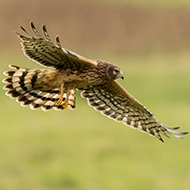Record-breaking year for hen harrier breeding

The hen harrier is one of Britain's most distinctive birds.
New figures published by Natural England reveal that 2020 has been a record-breaking year for hen harrier breeding, with 60 chicks fledging from 19 nests across the North of England.
Natural England reports the success can be attributed to various factors, including high numbers of voles, their natural food source, ideal weather conditions, and a strong partnership between conservation groups.
Hen harriers are one of England's rarest birds of prey. Once common across much of upload and lowland Britain, they became exceptionally rare after 1830 thanks to raptor persecution - a practice that became illegal in 1954.
Just over two decades ago, Natural England established the Hen Harrier Recovery Project to monitor the remaining hen harriers on their northern England breeding grounds and try to identify the reasons why numbers are currently so low. Tony Juniper, chairman of Natural England, welcomed the results of the project but cautioned against complacency:
“Too many birds still go missing in unexplained circumstances and I urge anyone who is still engaged in the persecution of these magnificent creatures to cease at once,” he said. “Hen harriers remain critically endangered in England and there is a long way to go before the population returns to what it should be.”
With their characteristic owl-like features, the hen harrier is one of Britain's most distinctive birds. Its stiff facial feathers direct sound toward their ears to enable them to hunt more effectively.
While conservationists believe that persecution is the main factor limiting hen harrier numbers in England, other factors such as the suitability of local habitats and food availability are understood to be significant in some areas.
Dr Adam Smith of the Game & Wildlife Conservation Trust (GWCT), said the results of the Hen Harrier Recovery Project were “promising”.
“Until this managed approach was adopted - at no small risk to the reputations of all involved - there was a damaging deadlock,” he said. “If this trend can be maintained and hen harrier conservation status further improved, whilst supporting the red grouse management that best delivers our unique heather uplands, it will be a real breakthrough for practical, working conservation.”



 The latest
The latest